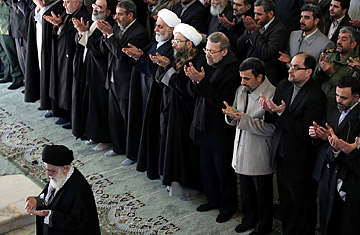
From friends to foes. Ahmadinejad's attempt to promote civilian, Islamist prerogatives at the expense of the clergy's authority ran afoul of Khamenei, the theocracy's Supreme Leader.
(2 of 4)
It is not that Ahmadinejad loves Washington. He just happens to be betting that most Iranian voters want to see an improvement in ties. In 2002, the last time a poll was taken on the subject in Iran, 74% of respondents said they were in favor of normalizing relations. Since then, no one has tried to replicate the poll because the man responsible for conducting it was thrown into jail. Nevertheless, in a likely signal to an Iranian demographic keen on renewed ties, Ahmadinejad mentioned that Iran was ready for talks with the U.S. in nearly every interview he gave during his September road show through New York City for the U.N. General Assembly. Still, the canny politician gave no hint of compromise on Iran's nuclear program--a sign that his warming toward the U.S. was targeted at a domestic audience that was also proud of the country's atomic research.
Khamenei has long blocked any attempt by Ahmadinejad to reach out to the West because that breakthrough would give the President enormous political capital at home. If Khamenei's loyalists come out on top in the vote, as most observers expect, they could move to impeach Ahmadinejad before his term is up next year. "Ahmadinejad and Khamenei are thirsty for each other's blood," says Mohsen Sazegara, a founding member of the Revolutionary Guards who now supports the Green opposition. "Khamenei's inner circle is just waiting in the wings to attack Ahmadinejad. This is a very serious rivalry."
How did it come to this? Even though Khamenei firmly supported Ahmadinejad in the aftermath of the controversial 2009 presidential vote that paralyzed the country with protests, the two men soon drifted apart. An emboldened Ahmadinejad attempted to find ways to shrink the power of the clergy--a move that was anathema to the Supreme Leader. The President began formulating his own economic and foreign policy and rebuffed Khamenei's advice. It wasn't long before he started purging Khamenei loyalists from his Cabinet. The feud spilled into the open last spring when Ahmadinejad tried to fire Intelligence Minister Heydar Moslehi, a close Khamenei ally. Moslehi was reinstated at Khamenei's behest, and Ahmadinejad showed his disapproval by staying away from Cabinet meetings for over a week.
Then things got bizarre: last spring, Khamenei loyalists accused several Ahmadinejad allies, including chief of staff Esfandiar Rahim Mashaei, of practicing witchcraft and summoning jinn, mystical creatures that exist in a parallel world. Many of this group of loyalists, who have been labeled the "deviant trend" by some hard-line newspapers, were arrested. And Mashaei faces possible jail time for alleged links to a $2.6 billion embezzlement scandal, the largest in Iranian history.
The pressure hasn't stopped. In early February, the Majlis, or parliament, summoned Ahmadinejad to appear by mid-March for disobeying the Supreme Leader and for mismanaging the economy. It's the first time a sitting President has been ordered to parliament for questioning. Impeachment hearings could start before the new parliament convenes this summer.
